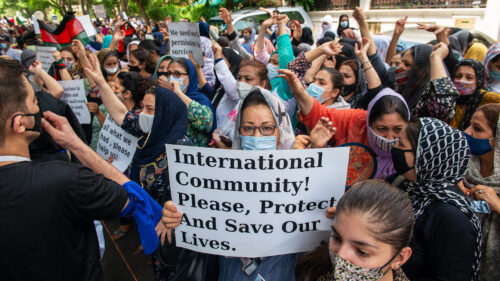[This is the fourth part in a ten-part series. To read more, see Parts 1,2 and 3 here.]
Caffè Italiano: The two meet again and immediately plunge into a deep discussion.
EU bureaucrat: My boss says enough talk of concepts and definitions. She wants your take on the issue of Muslim women. Can we discuss that?
Islamofactist. Sure, but first, tell me your concerns about Muslim women in Europe.
EU bureaucrat: Well, we’re really worried about Islamophobia against Muslim women. With identifiable clothing, they are more likely to experience discrimination and harassment, ranging from inappropriate staring to physical attacks.
Islamofactist: Absolutely, these hateful behaviors need to be stopped. Don’t Muslim women deserve protection from any form of discrimination?
EU bureaucrat: Of course. They must be free to realize their full potential.
Islamofactist: Then we also need to examine the challenges Muslim women face from within their community. Let’s go over some of the facts. Shall we?
EU bureaucrat: Sure.
Islamofactist: First, given the fact that marriage is significant in Islam, let’s take the issue of marriage between cousins. The fact is that Sharia, or Islamic law, encourages consanguineous marriages, or marriages between people of close relation. Research shows Arab countries display some of the highest rates of consanguineous marriages in the world, specifically first-cousin marriages, which may reach 25-30% of all marriages.
EU bureaucrat: Forget the Arab world. That’s of no concern to us in Europe.
Islamofactist: Unfortunately, the fact is that this practice has now come to the West because of Muslim migration. Recently, such marriages have become so common that a Muslim MP in the UK spoke out against a proposal to ban them and defended the practice of first-cousin marriage, claiming it can “help build family bonds.”
EU bureaucrat: Family bonds are important. Look at how our families have changed in Europe. We have much to learn from the Muslim family structure.
Islamofactist: Not if it goes against the woman’s will. Recall a BBC program in which a British Muslim woman spoke about how she knew from a young age she had been “promised” to her cousin. At the age of 17, she was taken from Scotland and forced to marry him in Pakistan.
EU bureaucrat: Such unfortunate things are bound to happen occasionally. It’s terrible for the woman, but there’s really no cost to society because of cousin marriages.
Islamofactist: Incorrect. The fact is that 30% of the UK’s genetically diseased children come from more than half of its first-cousin marriages. The Muslim woman suffers as a mother, and her children often start life handicapped in some way.
EU bureaucrat: These are harsh statistics, but the EU can’t determine who marries whom!
Islamofactist: Depending on household income, such horrific realities are limitless. The fact is, although British Pakistani families are thirteen times more likely than the general population to have children with these disorders, the British taxpayer is expected to bear the cost of their care.
EU bureaucrat: We must bear the expense willingly. After all, they are children.
Islamofactist: Unfortunately, the challenge Muslim women face doesn’t stop at cousin marriages. There is also the question of the Muslim woman’s virginity.
EU bureaucrat: Virginity? What in the world are you talking about?
Islamofactist: It’s true. The fact is, virginity testing has now come to Europe.
EU bureaucrat: But virginity is so old-fashioned! If I remember, Parthenos, the Greek word for virgin, referred to the gods Athena and Artemis. My history teacher told us that Athena never took a lover or married, and Artemis was the virgin goddess of the hunt. In later Roman society, Vestal Virgins were some of the empire’s most important citizens. But that was in ancient Rome! This is the 21st century!
Islamofactist: You have an excellent memory, but the fact is, it’s become an issue because of Muslim migration to the West. The New York Times reported in an article entitled “In Europe, Debate Over Islam and Virginity,” “As Europe’s Muslim population grows, many young Muslim women are caught between the freedoms that European society affords and the deep-rooted traditions of their parents’ and grandparents’ generations. Gynecologists say that in the past few years, more Muslim women are seeking certificates of virginity to provide proof to others.” Another publication interviewed a Muslim woman in Paris who said, “In my culture, not to be a virgin is to be dirt,” as she waited for surgery to restore her hymen before marriage.
And Yasmine Mohammed, an ex-Muslim and author of Unveiled, observed that the most important aspect of a girl’s honour is her virginity: “Families must keep a close eye on girls, making sure they do not demolish the family honour by losing their virginity – whether they do this willingly or because they were raped is irrelevant. The aim is to ensure, like a vitamin bottle, that their ’seal’ is not broken before they are delivered to their husbands.”
EU bureaucrat: That’s terrible. I don’t know if my boss knows about this. We must take care of it.
Islamofactist: That’s not quite correct. The fact is that in 2018, a group of United Nations agencies issued a joint statement calling for a ban on tests meant to assess the virginity of a girl or a woman. The UN Human Rights Office (OHCHR), UN Women and the World Health Organization (WHO) said that “this medically unnecessary, and oftentimes painful, humiliating and traumatic practice must end.”
EU bureaucrat: I’m glad that’s taken care of.
Islamofactist: If only that were the end of it. The challenges faced by Muslim women continue because of strong cultural pressures.
EU bureaucrat: Muslim women don’t need to handle other challenges from within their communities, right?
Islamofactist: Incorrect. Let’s factually look at the challenges facing European Muslim women in sports, for instance.
EU bureaucrat: Sure. I often see the media celebrate female Muslim athletes competing while wearing a hijab, shattering stereotypes.
Islamofactist: It’s true that such women are courageous. The fact is, however, that Muslim women face substantial internal cultural barriers to competing in sports. In a 2023 report published by the Muslimah Sports Association, 65% of Muslim women surveyed agreed that “there are religious/cultural barriers that limit/stop their participation in sports.” It referred to “local mosques who have historically found it challenging to engage females in sports” and quoted a Muslim woman who said she faced “expectations from culture/family to give up childhood sports, as I matured and became older.” A peer-reviewed study entitled “Daughters of Islam: Family Influences on Muslim Young Women’s Participation in Sport” found “extensive parental influence on the young women’s involvement in the sports program and over their lives as a whole, and the significance of Islam within this.” According to the Huffington Post, “Their biggest hurdle preventing girls from taking up sports is religious extremism.”
EU bureaucrat: That’s rather concerning. What we need are Islamic websites to give progressive advice on women’s participation in sports. That’ll solve it, won’t it?
Islamofactist: You’ll be disappointed. The fact is, the advice given to young Muslim girls is highly restrictive.
EU bureaucrat: Any examples?
Islamofactist: Yes. A fifteen-year-old Muslim girl asked an Islamic blog if a Muslim girl can play sports. The reply was circumstantial, based on the following guidelines:
- The sport should be far removed from the eyes of men.
- The sport should not lead to any argument or conflict.
- There should be no music playing during practice or games.
Furthermore, what is most preferable, best, most prudent, and most concealing for women is for them to engage in sport and exercise at home, not in clubs, gyms, and schools, even if there is no mixing in those places because there is no guarantee that a woman will not be photographed by one of those devils that look out for such opportunities, which would lead to bad consequences. If there is mixing in those places, then it is obviously not allowed, as we have explained above. We advise our sisters[…] to stay in their houses, and not go out unnecessarily, in obedience to the words of Allah, may He be exalted.”
EU bureaucrat: But you can’t say that!
Islamofactist: I’m not saying anything and am only pointing out the facts of the content on the Islamic website.
EU bureaucrat: And they have put it on the Net?!
Islamofactist: Yes. That’s not all. The Islamic expert also stated, practicing sports in “schools, institutions, and universities, is not possible … the introduction of physical education is one of the main causes of indecency, immorality … and the death of modesty … demanding the introduction of physical education in girls’ schools is following in the footsteps of the Shaytan (Satan), which Allah, may He be exalted, has forbidden.”
EU bureaucrat: Hmmm … I wonder if my boss knows this. She is a marathoner and is training to compete in the Ironman in Nice in June this year. Look, let’s talk about the hijab, shall we? Muslims have the right to wear this, and it has no downsides. Correct?
Islamofactist: No. Again, the fact is that the Nevada-based International Union of Muslim Women states, “It is a documented fact that religious women who dress modestly can and do seem to suffer more vitamin D deficiencies than women who don’t cover.” Another study showed “the consistency of gender differences in physical inactivity: in nearly all (45/53) studies conducted among adults and (31/32) among children/adolescents, prevalence of inactivity was higher among women/girls” and that “traditional religious norms have been reported to potentially define acceptable behaviors for women and preclude exercising.” It also noted “lower physical activity among women has been attributed to gender norms, including conservative dress that is not suitable for physical activity, the need for women to be chaperoned in public spaces, and the paucity of gender-segregated fitness facilities.”
EU bureaucrat: But it’s their culture. If they are willing to run some risks to their health and want to wear the hijab as a symbol of their deep commitment to their faith, who are we to intrude in this matter? They wear it of their own free will.
Islamofactist: Again, you are off the mark. The fact is that pressure can often be applied on non-compliant Muslim schoolgirls to start wearing the hijab. In a recent controversy in the UK, a submission to the court on behalf of the school stated:
In one alleged incident described to the court, a child who had never previously worn a headscarf was pressured to wear one. A Muslim girl was said to have dropped out of the school choir after other Muslim children told her that it was haram (forbidden), while a number of other children were told they were “bad Muslims” for not praying and had begun to pray, according to written arguments before the court.
EU bureaucrat: Well, bullying often goes on in schools. The hijab is just an excuse.
Islamofactist: Sometimes, a girl forced to wear a hijab may be the cause of her death.
EU bureaucrat: That’s extreme. How so?
Islamofactist: In the UK recently, a father who beat his daughter to death had forced her to wear a hijab to “cover up the bruises.” According to the prosecution, he said he had “legally punished her, and she died.”
EU bureaucrat: Murders can be committed by followers of any religion. In any event, Muslim girls can flourish in our education system in Europe. Right?
Islamofactist: The fact is according to the European Academy on Religion and Society, “there are no barriers to women in education” in Europe, yet, it found, while writing on Islam and the educational gender gap in Europe, that “Most European women who follow Islam, for example, have all of these markers [of the education gap] in mind, especially when it comes to access to quality education[…]These hindrances are already reinforced particularly by their parents and peers […]it is being made more difficult for them by the patriarchal structures that have been reinforced by their cultural contexts[…] in their religious communities.”
EU bureaucrat: Any other study?
Islamofactist: There are many, but here’s one. A study by the University of Cambridge referred to the desire of Muslim women in Europe to “assert their right to take charge of their own lives” but also observed that “not all Muslim women have the internal drive, strength, or have been exposed to sufficient stimuli to take such a step” as they faced “narrow-mindedness which still exists in some closely-knit Muslim communities.”
EU bureaucrat: Oh boy! Let me see if I have understood you properly today. You are saying the Islamofactist method conclusively demonstrates that Muslim women are discriminated against and denied their full human potential and autonomy because of Islamic culture. Correct?
Islamofactist: Spot on.
EU bureaucrat: My boss will find this distressing, I dare say. (sotto voce to himself) How am I ever going to tell her all this? But I must…when she’s in a good mood.
Islamofactist: Pardon?
EU bureaucrat: I’m sorry. I just mutter to myself sometimes. Let’s continue tomorrow, shall we?
Islamofactist: Sure.
EU bureaucrat: (to the server) L’addition, s’il vous plaît.
They tussle over who will pay the bill and decide to split it. Outside, each goes their way, melting into the crowds.
[Cheyenne Torres edited this piece.]
The views expressed in this article are the author’s own and do not necessarily reflect Fair Observer’s editorial policy.
Support Fair Observer
We rely on your support for our independence, diversity and quality.
For more than 10 years, Fair Observer has been free, fair and independent. No billionaire owns us, no advertisers control us. We are a reader-supported nonprofit. Unlike many other publications, we keep our content free for readers regardless of where they live or whether they can afford to pay. We have no paywalls and no ads.
In the post-truth era of fake news, echo chambers and filter bubbles, we publish a plurality of perspectives from around the world. Anyone can publish with us, but everyone goes through a rigorous editorial process. So, you get fact-checked, well-reasoned content instead of noise.
We publish 3,000+ voices from 90+ countries. We also conduct education and training programs
on subjects ranging from digital media and journalism to writing and critical thinking. This
doesn’t come cheap. Servers, editors, trainers and web developers cost
money.
Please consider supporting us on a regular basis as a recurring donor or a
sustaining member.
Will you support FO’s journalism?
We rely on your support for our independence, diversity and quality.









Comment